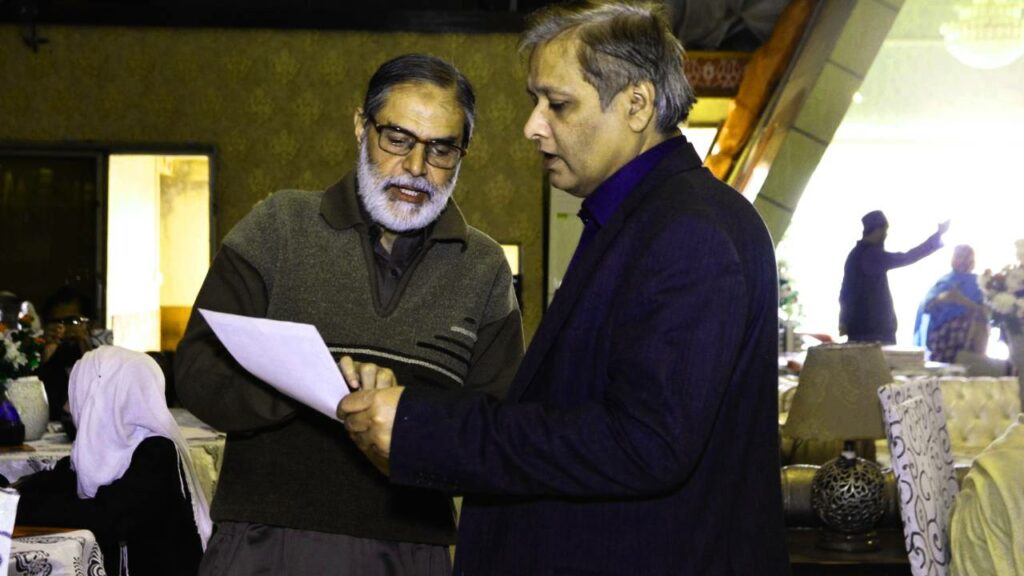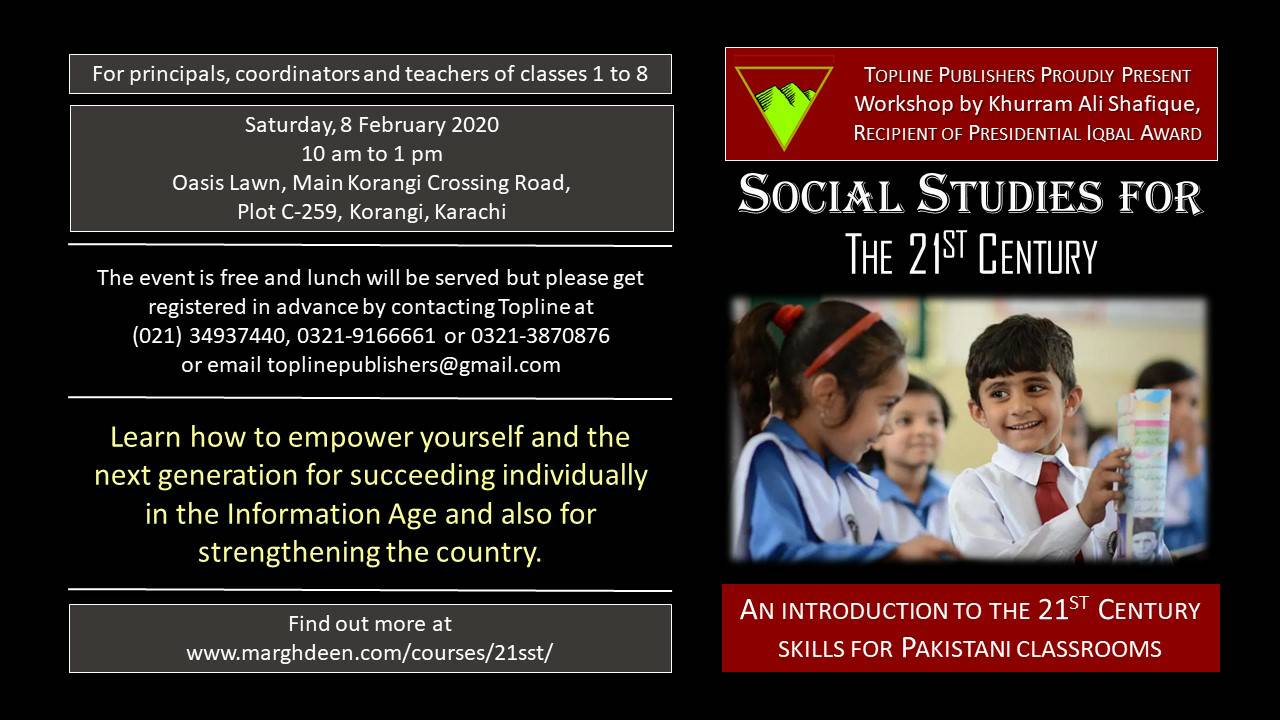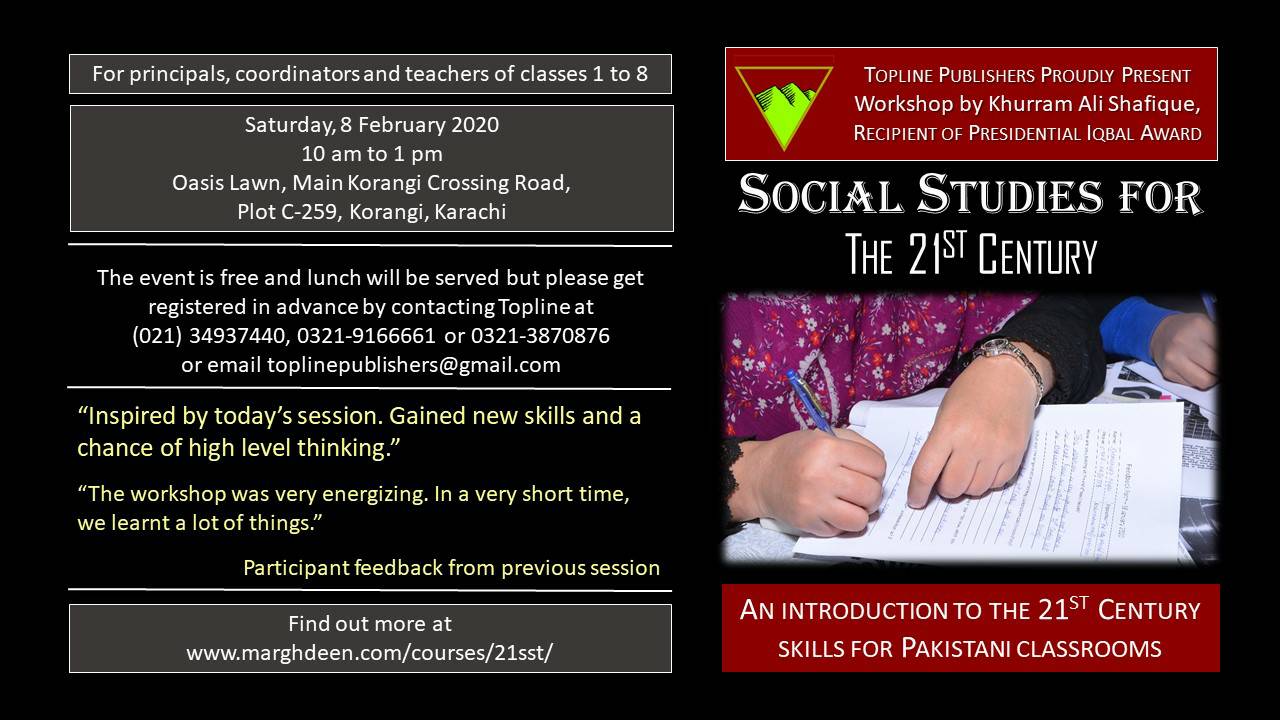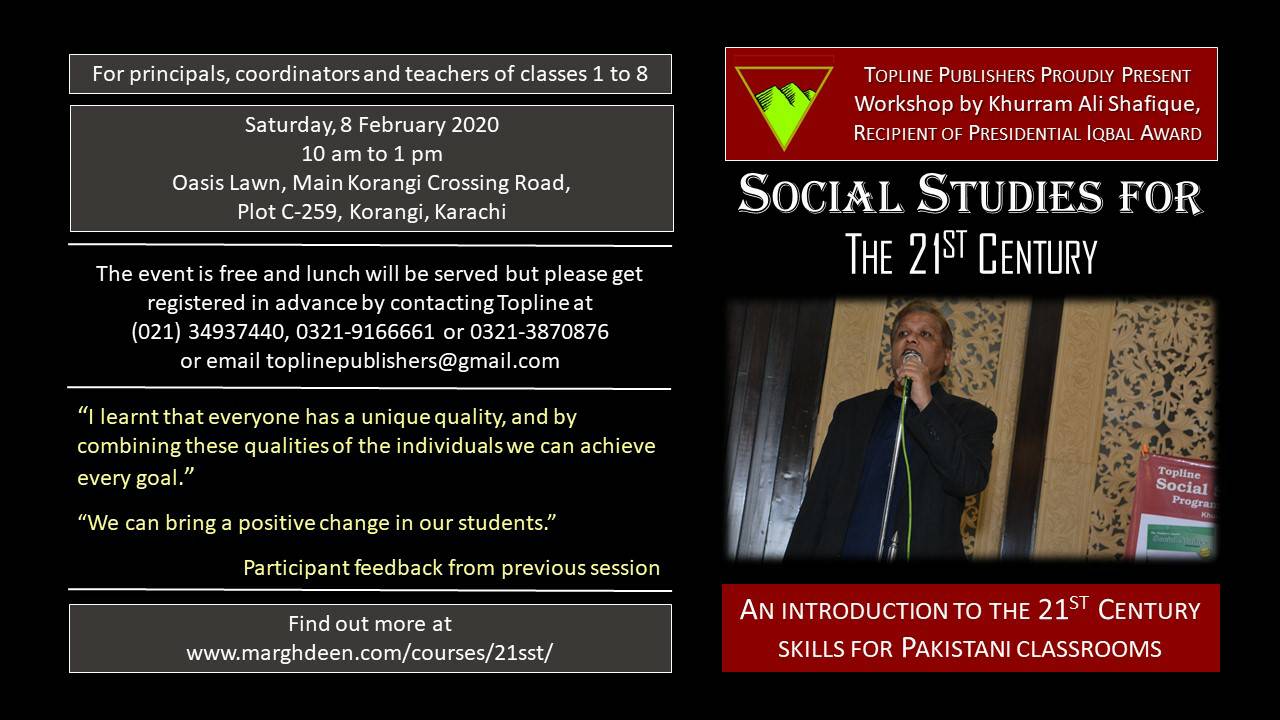
The following are some of the questions received from the participants of the workshop “Social Studies for the 21st Century”. The answers have been provided by the facilitator. This page will keep growing as more feedback is received during the re-runs of the workshop. If you have been a participant in the workshop, please note that only those questions are included on this page which are directly relevant to the contents of the workshop.
You may also like to see the Course Page, the Feelings Page and the Learning Page.
- The Pakistani context
- How can we facilitate our youth these days?
- I would like to know more about the interviews you had with poor children.
- Why you chose the story of Simorgh? There are many other topics.
- 21st Century Skills
- Why do we need the 21st Century skills?
- Can you suggest some methods for me to develop critical thinking in my students?
- How can we eradicate biases in the classroom?
- How can we develop “while reading activities”?
- How can we enhance creativity and communication skills of our students?
- How can we process information?
- How can I improve my students’ life skills?
- Can you suggest some methods for me to develop leadership qualities in my students?
- How can we develop a foresight about the future for our thinking and planning?
- How should we select our goals?
- How can we use social media efficiently for developing leadership skills?
- Which skills are more important for running an organization? Leadership skills or social skills?
- Why productivity is important as a 21st Century skill?
- How can we use the 21st Century skills with our students in the classroom?
- What improvements our next generation will have if they develop these skills?
- How can we convince people other than our students to apply these skills?
- What are the most important teaching skills in the 21st Century?
- Technical issues, problems and solutions
- What can a teacher do to change the system of our education, or the society in general?
- Why organize workshop only for the teachers and not for the school coordinators?
- What to do if we have learnt something valuable from the workshop but cannot apply it in the classroom due to old-fashioned policies imposed by the administration?
- How can we make Social Studies an interesting subject?
- How can we develop suitable activities for the Social Studies classroom?
- Students are not interested in Social Studies. Why?
- How can we arrange activities in school?
- I need a comparative study of the Topline Social Studies Programme with the textbooks produced by other publishers.
- Are “teacher guides” to your textbooks available?
- Are your books designed to bring change in our youth?
The Pakistani context
How can we facilitate our youth these days?
This can be a detailed discussion. A short answer within the limits of this workshop is that we can do so by first giving them the three higher aims, and then the 21st Century skills for achieving the aims.
The higher aims suggested (and explained) in my workshop are to (a) make Pakistan the leader of South Asia for establishing perpetual peace and justice in the region, including a fair settlement of the Kashmir issue and solution to the problems faced by the minorities in India; (b) completely eradicate poverty from Pakistan; and (c) achieve success in your personal career while contributing towards these goals.
I would like to know more about the interviews you had with poor children.
The interviews which I mention in my workshop were not with poor children but with adults. I have often asked the most under-privileged and unschooled adults about the dreams they have about the future of Pakistan. The answer I get most of the time is that they want a country where poverty does not exist for anybody. I find it very interesting because this is what Quaid-i-Azam Muhammad Ali Jinnah also emphasized in practically every address to the nation from 1936 till his death.
Iqbal also was quite convinced that we cannot just decrease poverty but actually eliminate it completely (see my post about “conscious evolution“). The educated minds cannot conceive this anymore, except as a distorted fantasy, but the unschooled Pakistanis often show their firm conviction in this matter.
Why you chose the story of Simorgh? There are many other topics.
I choose the story of Simorgh for contextualizing the 21st Century skills because the story has that potential. For the significance of this story in our culture itself, please see my post about the uniform culture.
21st Century Skills
Why do we need the 21st Century skills?
The answer depends on who you ask. My answer as suggested in the workshop is that we need these skills in order to achieve three higher aims, which are to (a) make Pakistan the leader of South Asia for establishing perpetual peace and justice in the region, including a fair settlement of the Kashmir issue and solution to the problems faced by the minorities in India; (b) completely eradicate poverty from Pakistan; and (c) achieve success in your personal career while contributing towards these goals.
Can you suggest some methods for me to develop critical thinking in my students?
Critical thinking is one of the four learning skills of the 21st Century. As such, there is ample material available on this subject on the Internet. If you type “21st century skills critical thinking” in Google search, the results page offers you some good options.
How can we eradicate biases in the classroom?
I understand that this question is relevant to collaboration, one of the learning skills in the 21st Century. I suggest that you go through my series of blog posts, “The untold story of Pakistan from 1858 to 2026“, and / or participate in the course by the same title.
How can we develop “while reading activities”?
As I suggest in the workshop, the use of while reading activities can be very useful developing creativity, which is one of the four learning skills (or the 4 C’s) of the 21st Century. “The information cycle” can be very useful for this purpose. It is the subject of my workshop “The Seven Stages of Learning”, but I will also try to explain it in a post.
How can we enhance creativity and communication skills of our students?
Creativity and communication, along with critical thinking and collaboration, are the four learning skills of the 21st Century. They are collectively also called “the 4 C’s” of the 21st Century. As such, there is ample material available on this subject on the Internet. If you type “4 C’s of the 21st century” in Google search, the results page offers you some good options.
How can we process information?
“Information literacy” is also one of the 21st Century skills. As such, there is ample material available on this subject on the Internet. If you type “21st century skills information literacy” in Google search, the results page offers you some good options.
How can I improve my students’ life skills?
The life skills or career skills in the 21st Century consist of flexibility, leadership, initiative, productivity (sometimes labelled as “productivity and accountability”) and social skills. I hope that the activities carried out in the workshop give you a good start and especially help you see why you should use these skills with your students and what can be achieved through them in Pakistan and for Pakistan.
You can follow it up by taking general material available on this topic on the Internet and adopt it in the light of what you have learnt in the workshop. If you type “life and career skills in 21st century” in Google search, the results page can lead you to some good samples of general stuff.
Can you suggest some methods for me to develop leadership qualities in my students?
I suggest that you go through my series of blog posts, “The untold story of Pakistan from 1858 to 2026“, and / or participate in the course by the same title.
How can we develop a foresight about the future for our thinking and planning?
At least from the Pakistani point of view, this is a very aspect of leadership, which is a career or life skill in the 21st Century. I have tried to address it in more detail in “The Untold Story of Pakistan from 1858 to 2026”, the course as well as the blog series.
How should we select our goals?
I understand that this is an important aspect aspect of leadership, which is a career or life skill in the 21st Century. I have tried to address it in more detail in “The Untold Story of Pakistan from 1858 to 2026”, the course as well as the blog series.
How can we use social media efficiently for developing leadership skills?
First, please see what I have suggested for developing leadership skills in my series of blog posts, “The untold story of Pakistan from 1858 to 2026“, and / or the course by the same title. Then, use social media for developing the purpose. To use social media efficiently with students for a number or purposes, you can find ample material on the Internet. If you type “how to use social media efficiently with students” in Google search, the results page offers you some good options.
Which skills are more important for running an organization? Leadership skills or social skills?
Both are important but perhaps the leadership skills would find more emphasis in this case.
Why productivity is important as a 21st Century skill?
Productivity (sometimes labelled as “productivity and accountability”) is one of the life or career skills in the 21st Century. As such, there is ample material available on it on the Internet. If you type “21st century skills productivity and accountability” in Google search, the results page offers you some good options.
How can we use the 21st Century skills with our students in the classroom?
I hope that the activities carried out in the workshop give you a good start and especially help you see why you should use these skills with your students and what can be achieved through them in Pakistan and for Pakistan. You can follow it up by taking general material available on this topic on the Internet and adopt it in the light of what you have learnt in the workshop. If you type “how to use 21st century skills in the classroom” in Google search, the results page can lead you to some good samples of general stuff.
What improvements our next generation will have if they develop these skills?
If they develop these skills with the modifications suggested in my workshop, we can hope that they can lead to the achievement of three higher aims, i.e. to (a) make Pakistan the leader of South Asia for establishing perpetual peace and justice in the region, including a fair settlement of the Kashmir issue and solution to the problems faced by the minorities in India; (b) completely eradicate poverty from Pakistan; and (c) achieve success in your personal career while contributing towards these goals.
How can we convince people other than our students to apply these skills?
Why convince them? Achieve your goals, and others will then want to know the skills which helped you succeed.
What are the most important teaching skills in the 21st Century?
This is the subject of a separate course “How to become a 21st Century educator for Pakistan”. Hopefully, it will be offered soon. So, please keep checking this website and / or my Facebook page and Twitter. Or, send me an email at khurramsdesk@gmail.com with request to update you when the course is offered.
Technical issues, problems and solutions
What can a teacher do to change the system of our education, or the society in general?
I hope to address this question at least partially in my forthcoming course, “How to become a 21st Century educator for Pakistan”. Hopefully, it will be offered soon. So, please keep checking this website and / or my Facebook page and Twitter. Or, send me an email at khurramsdesk@gmail.com with request to update you when the course is offered.
Why organize workshop only for the teachers and not for the school coordinators?
This workshop is not only for the teachers. It has been advertised as also for school coordinators.
What to do if we have learnt something valuable from the workshop but cannot apply it in the classroom due to old-fashioned policies imposed by the administration?
Unfortunately, there is no simple answer to this question. Solutions vary according to each case.
How can we make Social Studies an interesting subject?
Of course, there are more than one solutions. The suggestion based on this workshop is that if you incorporate the 21st Century skills in your lessons after contextualizing them for Pakistan, as suggested in this workshop, it is likely that Social Studies will become more interesting for your students (and even for you!).
How can we develop suitable activities for the Social Studies classroom?
For “while reading activities”, the best solution is “The Information Cycle”. I cover it in my workshop “The Seven Stages of Learning”, and also hope to write a separate post about it in future.
For other activities, please take a look at The Topline Social Studies Programme. Many ideas have been included there. For any assistance in acquiring these books, or to follow up, please feel free to contact Topline Publishers at 021-34937440 or 03213870876, or email them at toplinepublishers@gmail.com
Students are not interested in Social Studies. Why?
If your students are not taking interest in a particular subject, you are the best person to find out. You may ask them directly, or find out what are their current interests and life goals, and so on. But the research has to be done by you. We can try to provide solutions once you tell us why your students are not interested in Social Studies, and what are they interested in (but you may also like to see the answer given here to the question “How can we turn Social Studies into an interesting subject?”).
How can we arrange activities in school?
Please contact Topline Publishers at 021-34937440 or 03213870876, or email them at toplinepublishers@gmail.com Alternatively, you can also email me at khurramsdesk@gmail.com
I need a comparative study of the Topline Social Studies Programme with the textbooks produced by other publishers.
Please contact Topline Publishers at 021-34937440 or 03213870876, or email them at toplinepublishers@gmail.com
Are “teacher guides” to your textbooks available?
In some cases, yes. Please contact Topline Publishers at 021-34937440 or 03213870876, or email them at toplinepublishers@gmail.com
Are your books designed to bring change in our youth?
Yes.
You may also like to see the Course Page, the Feelings Page and the Learning Page.
The next session of the workshop is being offered by Topline publishers from 10 am to 1 pm on 8 February 2020 at Oasis Lawn, Main Korangi Crossing Road, Plot C-259, Korangi, Karachi. The event is free and lunch will be served with compliments of the host but please get registered in advance by contacting Topline at (021) 34937440, 0321-9166661 or 0321-3870876 or email toplinepublishers@gmail.com



